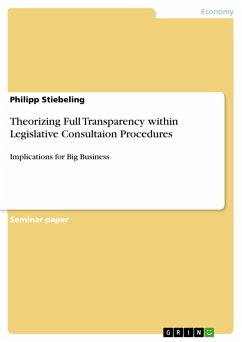Seminar paper from the year 2010 in the subject Business economics - Operations Research, grade: 1,0, Berlin School of Economics (IMB Institute of Management Berlin), course: Global Governance, language: English, abstract: With the breakthrough in information technology since the early 1990s pivoting in a maturing global information network accessible for a broad mass of consumers called the internet, the power information relays to its "owner" and the means and speed of its diffusion have been revolutionized. In this context, looking at various societal actors, the issue of equal access to and transparency of information triggered not only broad scientific research efforts, but again placed the spotlight of public scrutiny on the issue of transparency of information in societal, economical and governmental mechanisms of decision making and business conduct. Civil society bombarding multinational enterprises with postulations to disclose supply chain locations and their labor and environmental practices especially abroad conveys that not doing so bears certain, if not even very lucrative, advantages for such businesses. With governmental legislation setting the stage for businesses` profitability in many realms, exerting "selfish" influence on national politics holds great allurement for business itself. Fronting supranational joint efforts like the establishment of the OECD Financial Action Task Force1 of the G-7 member states or the European Transparency Initiative2, business has ever since the beginning of nation states found its way to interact with the mechanism ultimately affecting their profitability in a regulatory or constraining way. Looking back at the financial crisis of 2008, it becomes clear that nowadays business making use of their involvement in shaping national policies has not declined at all. The multinational "Cash for Clunkers" law and the failure of the "nutrition facts traffic light" law in Germany prove conclusive examples of how "a passive transmission belt for corporate interest" (Stubbs 2006: 171) in form of lobbyism successfully influences legislative outcomes which crucially benefit a certain societal group. With a broad landscape of "industries of intermediaries" (Bac 2001: 95) which offer not only the expertise but also the necessary connections to crucial hotspots of legislative decision making, "Big Business" is successfully leveraging its` resources to increase its power. Consequently civil society`s scrutiny in terms of where and to what extent certain business actors are involved in legislative outcomes is vital to ensuring the common good being put ahead of interests of certain societal elites.
Dieser Download kann aus rechtlichen Gründen nur mit Rechnungsadresse in A, B, BG, CY, CZ, D, DK, EW, E, FIN, F, GR, HR, H, IRL, I, LT, L, LR, M, NL, PL, P, R, S, SLO, SK ausgeliefert werden.









